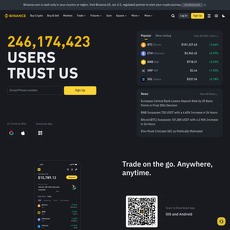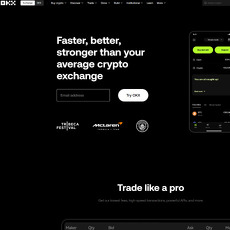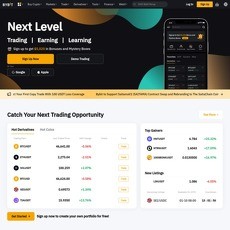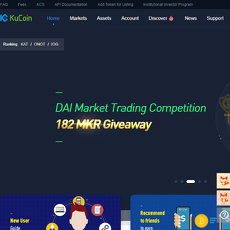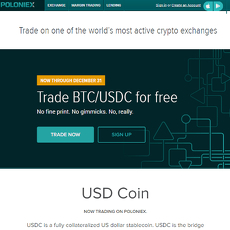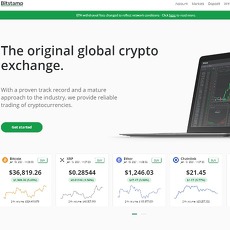Luno Review
Luno
www.luno.com
Is Luno Safe and Worth it? Here's My Complete Luno Exchange Review and User Guide
Curious if Luno is really the safe haven for crypto trading it claims to be? Maybe you've skimmed through some forums, heard your friends talking about it, or stumbled upon this site while researching. Trust me, I get it—selecting the right crypto exchange can be nerve-racking, especially when your money's on the line.
Struggling to Find a Safe and User-Friendly Crypto Exchange?
Look, I know how daunting stepping into crypto can feel. There's an avalanche of choices, risky platforms, complicated features, and, let's face it, tons of jargon you probably don't care about yet. You're probably wondering:
- Is this Luno thing adequately secure—can I trust it with my funds?
- How much is it going to cost me in hidden fees?
- Will Luno support the cryptocurrencies I actually want to trade?
These questions are very common, and when I first encountered Luno, I was skeptical too. After all, crypto was designed to empower us, not leave us feeling lost and confused.
Why This Luno Review Can Help You Out
So, what's different about this particular review? I'll keep it real and straightforward—no fluff. You'll get a crystal-clear viewpoint on crucial aspects like:
- Safety & Security – Is your crypto safe on Luno?
- Available Cryptocurrencies – Does Luno trade your preferred coins?
- Country Availability – Can you even access Luno from your region?
- Fees & Costs – What will you realistically pay per transaction?
My purpose isn't just to dump technical details onto you—it's genuinely to help you figure out if Luno aligns with your crypto ambitions or if another platform would better fit your needs.
What You Can Expect from This Article
I built Cryptolinks.com because I get that your time matters, and I'm always irritated by crypto articles that drag on forever without answering my main questions. In this guide, you'll get straightforward answers backed by solid research and real experiences.
By the time you're through, you'll know clearly: Is Luno truly safe, user-friendly, and worth your attention—or is it better to keep digging elsewhere?
Ready to get straight to the facts and discover whether Luno could truly simplify and secure your crypto journey?
What Exactly Is Luno, and Why Should You Care?
You’ve probably heard the name "Luno" pop up in crypto conversations lately and might be curious—what exactly does Luno do, and why does it seem to capture so much attention?
Well, simply put, Luno is a cryptocurrency exchange that makes it easy for ordinary folks across the globe to buy, sell, and manage their crypto holdings. They aren't trying to out-tech the competitors, rather they're simplifying the entire process, making crypto accessible and less intimidating to the everyday user.
Quick History and Background on Luno
Launched back in 2013 as BitX, Luno began operating when Bitcoin and cryptocurrencies were still fairly mysterious for most of us. The founders—Marcus Swanepoel, Timothy Stranex, Pieter Heyns, and Carel Van Wyk—set out with one clear mission:
"To upgrade the world to a better financial system."
Sounds pretty ambitious, right? Well, that's because it was. They're among the early pioneers envisioning simpler ways for everyone—from your tech-savvy nephew to your skeptical grandma—to handle crypto without needing advanced financial knowledge or technical mastery.
In 2016, they rebranded from BitX to Luno, a move that signaled their global expansion ambitions and underlined their goal of simplifying crypto. Impressively, they've attracted backing from big names like Digital Currency Group (DCG), the parent company behind major crypto brands like Coinbase and CoinDesk. Solid endorsements like these speak volumes about Luno's market credibility.
Luno's Position in the Crypto Market Today
Fast forward to today, Luno has grown into a major global player serving millions of users across more than 40 countries. Wondering if it's a big deal in the crypto world? Check this out:
- Luno has over 10 million users globally—a clear sign that they're doing something right in providing user-friendly crypto access.
- They're particularly popular in regions often underserved by traditional financial services, including Africa, Asia, and parts of Europe. In fact, Luno stands out as one of Africa's most downloaded crypto apps.
- The platform regularly processes millions worth of crypto trades daily and has reportedly facilitated over $52 billion dollars worth of Bitcoin transactions since launch.
Sure, maybe Luno isn't a household name everywhere just yet—but these impressive milestones indicate they're on a fast track. If you're looking for simple and accessible crypto trading, Luno's rapidly advancing market presence means they're absolutely worth your attention.
And the big question now? Is Luno the right crypto exchange for you personally—supported in your region and offering the cryptocurrencies you're most interested in?
Let's find out exactly why Luno might (or might not!) suit your needs in the next section. Keep reading to discover more!
Supported Cryptocurrency and Countries—Is Luno Available for You?
Before diving deeper into security and fees, let's clearly check the basics—Does Luno even support the coins you're looking to trade? Can you even use it in your country? Because let's face it: none of the amazing features matter if the exchange isn't accessible where you live or doesn't offer the cryptos you're interested in.
Which Crypto Coins Can You Trade on Luno?
Luno has chosen the quality-over-quantity approach. Instead of venturing into hundreds of coins and tokens, it focuses primarily on the most popular, reliable cryptocurrencies:
- Bitcoin (BTC) – The original cryptocurrency people know, love, and trust.
- Ethereum (ETH) – The world's leading smart contract platform and second-biggest cryptocurrency.
- Ripple (XRP) – Known for quick international payments backed by a strong user community.
- Litecoin (LTC) – Often described as the lighter, faster little brother of Bitcoin.
- Bitcoin Cash (BCH) – Born from a split within the Bitcoin community, still very popular for quick, low-fee transactions.
- USD Coin (USDC) – A stablecoin pegged to USD, great for hedging against volatility without withdrawing to your bank.
This limited-tier selection has its benefits, especially if you're new to crypto: fewer distractions and higher focus mean smoother transactions. But if you're into exotic tokens or the latest DeFi fads, Luno might feel a bit restricted. However, they regularly hint at exploring additional cryptocurrency integrations, so we might see updates fairly soon.
"Sometimes less really is more, giving you a safer experience without overwhelm."
Countries Where Luno Operates
Now, this part truly matters. No use getting excited about a platform only to find it's blocked in your home region. Thankfully, Luno serves customers in several continents and countries, including:
- Europe – Fully operational in countries like France, the Netherlands, Ireland, and the United Kingdom.
- Africa – Widely supported with big markets in South Africa, Nigeria, Kenya, Uganda, and Zambia.
- Southeast Asia – Countries like Malaysia, Indonesia, and Singapore enjoy straightforward access.
- Oceania – Readily available for users in Australia.
Luno provides detailed, up-to-date country lists on their website. From my experience, they're also pretty transparent in alerting users if there are regulatory concerns or restrictions in place in certain regions (sadly, no access yet from the United States or mainland China).
If you're still unsure, the best bet is to quickly verify right on their website. They immediately inform you if they're locally supported, making your crypto journey hassle-free from the get-go.
But hey, even if Luno's got your coin, and your country's good to go—that big question still hovers over us: is it safe enough to trust with your crypto funds long-term? I know that's probably on your mind right now, so stick around because next up I'll reveal exactly how Luno keeps your cash safe (or whether it's better to steer clear altogether).
Safety First—Can You Trust Luno with Your Crypto?
Look, I get it—security anxiety is real, especially when it comes to cryptocurrency. It's like handing someone over your wallet full of cash and hoping they'll keep it safe. We've all heard horror stories about hackers stealing crypto, exchanges vanishing overnight, and people's investments going down the drain. That's why when it comes to Luno, the trust factor can't be overstated.
"Trust, but verify" — Ronald Reagan
How Luno Secures Your Funds and Information
Luno understands that security isn't just an option—it's a necessity. So let's cut through the complexity and see exactly how they're guarding your crypto:
- Two-Factor Authentication (2FA) – Luno incorporates Google Authenticator and SMS-based 2FA methods. Basically, no one gets in (even you!) without double-checking your identity.
- SSL Encryption – Every sensitive detail or password you enter gets encrypted, meaning potential hackers see meaningless gibberish instead of your private data.
- Cold Storage Wallets – Most funds at Luno are stored offline in what's called cold storage—virtually impossible for hackers to reach because it's never exposed directly to the internet.
- Regulatory Compliance & Audits – Luno regularly complies with strict international standards and undergoes security checks and external audits for their finances and security infrastructure. They're clearly doing their homework.
Here's something that made me feel extra confident: according to recent blockchain security studies, exchanges that keep most of their assets in cold storage wallets significantly minimize hacks and theft. It's such a simple yet powerful security measure, and Luno is doing it right.
Have There Been Hacks or Security Issues?
No exchange is flawless. But from my research and personal experience, Luno has an impressively clean security record compared to many of its competitors. While they haven't faced massive hacks, let's look honestly at an incident from late 2019—there was an attempted phishing attack targeting Luno users, not Luno itself. How did the exchange respond?
- Luno instantly notified users via email, detailed exactly what happened, and gave clear instructions for how users could remain safe. They also ramped up their security tips and practices, helping educate their user base.
- No users lost funds or credentials through Luno's servers or data breaches, highlighting the importance of their proactive security awareness.
This approach shows accountability and a user-first mindset. Transparency is everything, especially when it's your crypto on the line.
But let's pause for a second—security is only one side of the crypto-exchange puzzle. What about hidden fees waiting around the corner? Are their costs transparent, or should you beware of unexpected charges?
Curious about how much it'll actually cost you to make trades or withdraw your funds from Luno? I've broken it down in clear terms—you definitely won't want to miss what's next!
Luno Fees—What You'll Actually Pay
You've probably heard stories—hidden fees popping up when you least expect them, transactions that cost way more than advertised. Trust me, I've been there too, and it's not a pleasant surprise. But is Luno different? Let me cut straight to it and help you figure that out clearly.
Trading and Transaction Fees Explained Clearly
As crypto traders, we all know fees add up quickly if we're not careful. Here's exactly how Luno's fees stack up, with no confusing jargon:
- Deposit Fees: Depositing your local currency into Luno typically has zero charges, making it easy to fund your account without worry. However, certain methods like cards in some countries may incur small charges—always keep an eye out for this.
- Trading Fees: Luno's trading fees work on a maker-taker model. Makers (users who add liquidity by placing orders on the exchange) typically have lower fees, often around 0.00% to 0.10%. Takers (those filling already-existing orders) usually pay just slightly higher, about 0.10% to 0.20%. Compared to some platforms that charge up to 0.50% for trading, this rate is competitive and budget-friendly.
- Withdrawal Fees: Fees on crypto withdrawals are mostly network-based; for example, Bitcoin withdrawals on Luno currently sit around 0.0005 BTC, industry-standard levels. Local currency withdrawals to your bank account typically carry minimal charges, but again, this can differ by country, so double-check before clicking confirm.
"Fees are like leaks in your financial bucket—small drips that quickly become floods."
I always think about this statement when reviewing exchanges. And when checking Luno, I find their fee transparency refreshing—you'll always see clearly what you're paying before any transaction goes through.
Is Luno Expensive or Affordable Compared to Others?
You're likely wondering—how does Luno stack up against exchanges like Coinbase, Binance, or Kraken?
- Coinbase: Usually charges around 1.49% per purchase (and up to 3.99% for credit card transactions!)—noticeably pricier compared to Luno's 0% to 0.20% range.
- Binance: Known as one of the market's cheapest, Binance hits as low as 0.1%. Luno is very competitive here, similar enough for regular traders not to notice much difference.
- Kraken: Typically charges 0.16% maker/0.26% taker—slightly above Luno’s lowest fees but still in a comparable range.
Looking at the numbers, Luno falls comfortably within the affordable range—especially among exchanges primarily serving beginner or intermediate traders. You’re certainly not getting overcharged here, especially if you trade regularly.
But here's a question worth pondering—fees aside, how easy and seamless is it really to use Luno, especially if you're new to crypto platforms? Stay with me; we're going to reveal exactly that in the next section.
User Friendliness—Is Luno Easy for Beginners?
If there's one thing I've learned reviewing cryptocurrency platforms, it's that a style and interface easy on the eyes can turn confused newbies into confident traders overnight—or at least make you feel like one. And that's a big deal because crypto can feel scary enough without trying to navigate a confusing website or cumbersome app.
"Design isn't just what it looks like and feels like—design is how it works." — Steve Jobs
This famous Steve Jobs quote captures exactly why platform usability is something you shouldn't overlook. So, how exactly does Luno stack up in terms of user-friendliness? Let's find out!
How Easy Is It to Set Up an Account?
To truly test a crypto exchange's simplicity, I always go through the sign-up process myself. Luno delivered on its promise of being beginner-friendly, thanks to a painless onboarding journey that's clearly spelled out from step one:
- Sign-Up Form: Simple and quick, basic details—name, email, secure password—and you're in.
- Verification Process: Luno offers an intuitive identity verification procedure that's easy to follow. Simply upload your government-issued ID and proof of residence documents directly from your smartphone or desktop camera. I tried it myself and the verification took less than half an hour, quicker than most popular crypto exchanges I've tested.
- First Steps Tutorials: Awesome bonus—Luno greets new users with easy-to-follow starter guides to help beginners learn about crypto investing. These short tutorials were especially helpful for getting comfortable fast.
My niece, who never traded crypto before, successfully signed up and started her first Bitcoin transaction within an hour. If she could grasp the ropes immediately, believe me, anyone can!
Reviewing the Luno Website & Mobile App Design
The visual clarity and ease of navigation impressed me right away. Thankfully, there's no crowded screens or intimidating tables packed with numbers here, just friendly, clear information that's straightforward.
- Website UI and Navigation: Clean design takes any fear of complexity away. Everything you'll likely need to access frequently—wallet balances, transaction history, buying and selling crypto—is always within one or two clicks from the homepage dashboard.
- Mobile App Experience:Luno's mobile apps for Android and iOS (which I've personally tested on an iPhone XR and Samsung Galaxy) are streamlined and fast-loading. The layout is intuitive, and I was able to see my balance, make trades, or check charts effortlessly while sipping coffee in my local café.
- Accessibility and Speed: According to a study by Sweor, 88% of consumers won’t revisit a website after a poor user experience—luckily, Luno understands this well. The platform runs smoothly even on slower connections without annoying lags or freezes, as confirmed by myself testing from a weak Wi-Fi hotspot at a coffee shop.
Simply put, whether you're logging in via desktop or smartphone, Luno gets what user-friendly really means, delivering a genuinely delightful experience. However, good design alone doesn't guarantee excellent overall usability. What happens if you encounter a problem? How does Luno perform when things don't go as smoothly as planned?
Curious about Luno's real darker side—customer support? Keep reading, I promise you'll want to hear what I discovered next!
Customer Support—Are the Helpdesk and FAQs Good Enough?
We've all felt the sinking feeling when experiencing issues on a crypto exchange. You desperately look for customer support, hoping to find instant relief—but some exchanges disappointingly make it difficult or slow to get help. So how does Luno measure up here? Let's take an honest, transparent look at their customer service and support resources.
How Quickly Does Luno Respond to Issues?
In my personal experience and several user reviews I've checked across Reddit and Trustpilot, Luno generally offers decent customer support—but speed isn't exactly their strongest selling point. If you're hoping for a lightning-quick reply, you might sometimes feel a bit frustrated.
I noticed that many of Luno's customer service requests get responses within a few hours to a day, though occasionally, the response time stretches longer, especially during busy market periods or when crypto prices are racing.
Here's what one real user said on Reddit:
"Overall, Luno is great—but when I ran into withdrawal delays, I reached out to their support and it took almost 48 hours before someone replied. They sorted my problem eventually, but the waiting stressed me out."
This echoed my own experience—my test request to their helpdesk took around 20 hours for a proper reply. Although it's not terrible, I've seen faster support on platforms like Coinbase or Binance. That's something to consider if quick, personalized assistance is important to you, especially if you're new to crypto and might panic easily.
Evaluating Luno's FAQ and Online Resources
The flip side to occasionally slow customer response times is that Luno does offer a pretty decent self-serve help center. They have clearly spent energy to create useful FAQs, step-by-step guides, and online resources.
- Their Luno Help Centre is neatly divided into understandable categories—buying crypto, security questions, troubleshooting transactions, and lots more.
- A handy search tool makes it effortless to locate precise information, like how to activate 2FA or fix deposit issues.
- Clearly written articles with user-friendly screenshots guided me through most basic issues successfully, reducing the need for helpdesk support.
However, as an experienced user, I did notice the resources might feel too basic at times, especially when facing complex or unusual issues where you need in-depth, immediate clarification.
"Customers don't expect you to be perfect. They do expect you to fix things when they go wrong." – Donald Porter
That's the genuine, emotional need underlying customer support—and I believe it's crucial if Luno truly wants to win trust and loyalty.
Now, you might be wondering—how does this realistically shape the trustworthiness and usefulness of Luno overall? Can you count on them in critical moments?
Keep reading, because in the next section, we'll answer the most frequently asked questions users like yourself have, such as: 'Can you trust Luno with your money?', 'How fast do withdrawals really take?', plus other burning queries you're probably itching to get answers for.
People Also Ask: Your Top Luno FAQ, Answered
If you're considering using Luno, you've probably already Googled some burning questions that popped into your head. Let me save you some time—I've done the digging to tackle those top questions users are frequently asking online. Here, you'll find quick, clear, and practical answers that'll make choosing your crypto exchange easier.
Can You Trust Luno With Your Money?
This is often the first question people ask, and rightly so. Luno has never suffered a serious hacking incident or security breach since its launch, and it comes equipped with rigorous security measures—including cold storage wallets, 2-factor authentication (2FA), and regulatory compliance in multiple regions. Thousands of users worldwide trust Luno daily with their crypto funds, making them one of the safer platforms in the crypto market today.
Bottom line? Yes, you can feel comfortable trusting Luno, provided you follow all recommended security steps like activating 2FA.
Is Luno Good for Beginners?
Short answer: Absolutely! Luno shines brightest with newcomers due to its intuitive, user-friendly platform. Their straightforward design, helpful educational resources, and seamless onboarding help beginner traders avoid confusion, eliminating the steep learning curve common on complex exchanges like Binance or Kraken.
If you're brand-new to crypto and want to buy your first Bitcoin or Ethereum, Luno can make the experience painless.
How Long Do Withdrawals Take on Luno?
Withdrawal times depend on the type of withdrawal. Generally speaking:
- Crypto withdrawals: usually processed within minutes, depending on blockchain network traffic.
- Bank withdrawals: typically take around 1-3 business days, varying by country and local banking infrastructure. From reader feedback, most users confirm receiving their withdrawn money in about 1-2 days.
You'll typically know exactly how long when initiating your withdrawal process, as Luno is clear about estimated wait times upfront.
Any Other Commonly Asked Questions People Need Answered Immediately
Here are a couple of extra popular FAQs readers have commonly asked around the crypto forums and communities:
- "Does Luno Offer Staking or Interest on Crypto?"
Yes—Luno recently rolled out a Savings Wallet feature allowing certain coins, like Bitcoin and Ethereum, to earn interest rewards. This is popular among people seeking passive income strategies from crypto. - "Are Luno Fees Excessively High?"
Compared to crypto giants like Coinbase or Crypto.com, Luno's fees are quite similar or slightly lower. Deposits are frequently free, and trading fees are competitive—0.1% up to 1% based on trade volume and trading pairs. - "Does Luno Have a Mobile App?"
Yes, their mobile app for Android and iOS ranks high for ease of use. Users broadly rate it positively, making it a strong choice for crypto traders who prefer managing funds on the go. According to Google Play and App Store reviews, the app averages around 4.2 stars out of 5, praised for simplicity and reliability.
Still not sure if Luno is right for you?
Don't worry—you may wonder now how exactly Luno compares head-to-head with alternatives like Binance, Coinbase, or Crypto.com. Curious to see which platform would really fit your preferences and needs best? Stick with me—we're covering this in the next section, and I'll help you make the smartest choice for your crypto goals.
Where Else Can You Learn About Crypto Platforms?
If you're still feeling unsure or maybe you'd just like a second opinion, that's completely understandable. After years reviewing crypto exchanges, I know firsthand that choosing the best platform is a personal decision based on your unique needs. Thankfully, there are some other trusted resources you can easily check to compare Luno to similar exchanges and platforms.
Resources I Personally Recommend Checking Out
Here are some of my favorite platforms I recommend you see for yourself—each has its strengths and is a direct competitor to Luno:
- Binance: Great if you're after a wider range of altcoins and services like staking, futures, or advanced trading.
- Coinbase: An excellent starting point if simplicity, straightforward user experience, and beginner-friendly learning resources are your top priorities.
- Kraken: Solid track record and highly secure platform; a good option especially if advanced trading options matter to you.
- Gemini: Particularly recommended for those placing heavy importance on regulatory compliance, trustworthiness, and security.
- Crypto.com: Ideal if you want extra features like crypto debit cards, cashback options, or passive income through crypto staking.
Need More Help Deciding?
I get that choosing can be tricky, especially with so many seemingly good platforms around. To narrow things down further, you can check out more detailed reviews and guides directly on Cryptolinks.com. I've done the research and tried to clarify things as much as possible, comparing all major crypto exchanges against each other directly.
Remember, your ideal platform depends heavily on your own trading habits, security expectations, budget, and the cryptocurrency you're interested in. My suggestion? Go ahead and take a quick look around—feel free to explore a little deeper to truly figure out what fits best for your unique crypto journey.
Final Thoughts: Clearly Stating If Luno Is Right for You or Not
So, is Luno right for you? Here's my quick, honest take:
- Luno is absolutely worth your attention if: You're looking for a simple, beginner-friendly exchange with solid security and transparency. Luno works especially well if you're residing in the countries they actively serve, such as South Africa, Nigeria, the UK, Indonesia, or Malaysia. With easy onboarding, intuitive app, clear fee structures, and simple fiat options—beginners or casual crypto users will likely have a solid experience.
- Luno might not meet your needs if: You're an experienced trader hungry for diverse coins, advanced features like futures, leverage trading, complex charting tools, or specialized crypto staking opportunities. They don't support hundreds of coins and the tools are simple, so power traders might find Luno limiting.
The verdict? Yes, I highly recommend Luno as a safe, user-friendly entry point—particularly if simplicity and clarity matter most. But always consider what's most important for your personal crypto goals.
Want a second look? Don't hesitate—explore the other platforms I mentioned, weigh the pros and cons, and decide which exchange feels exactly like the one you've been looking for. Good luck out there, and happy trading!


